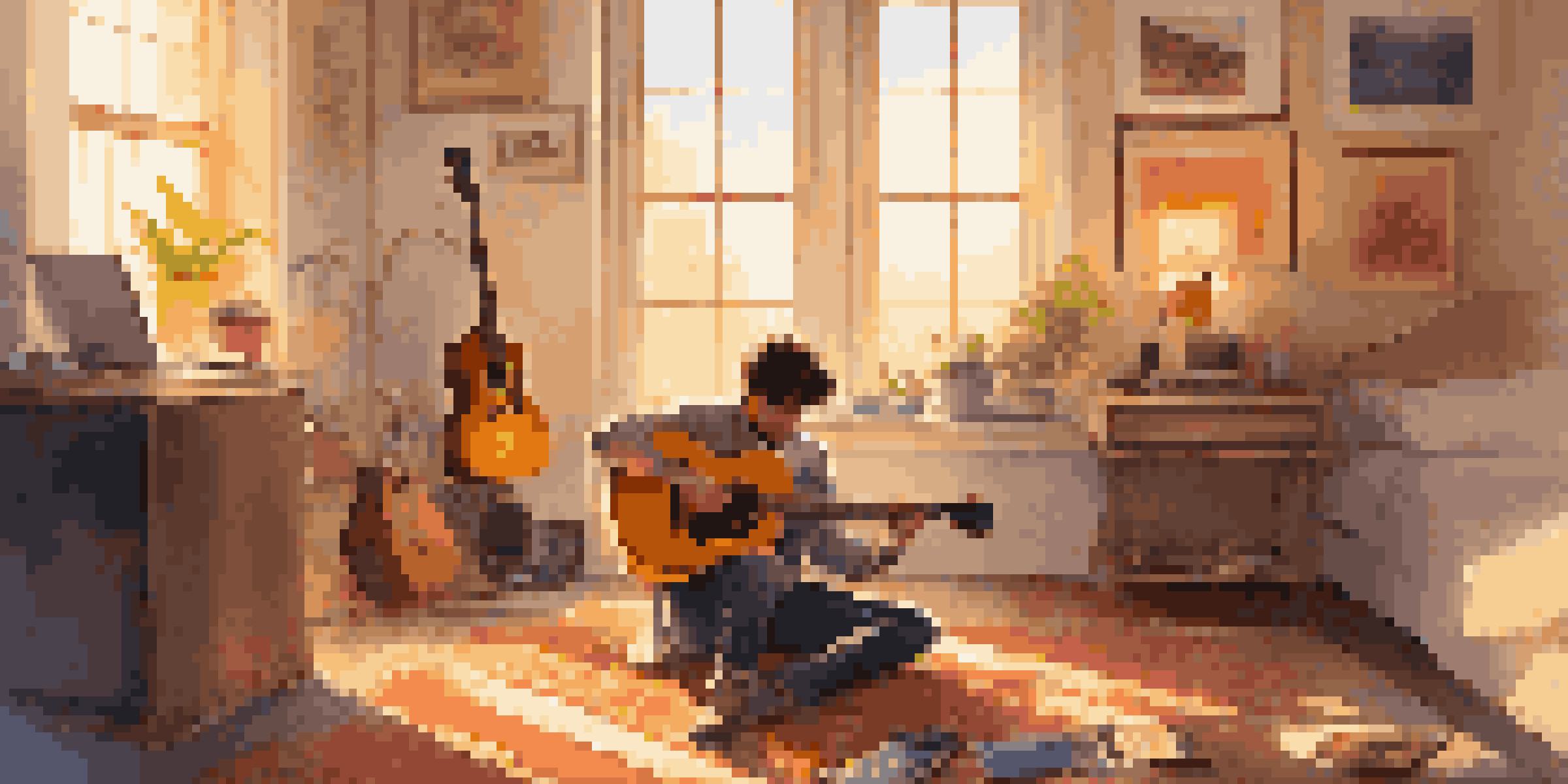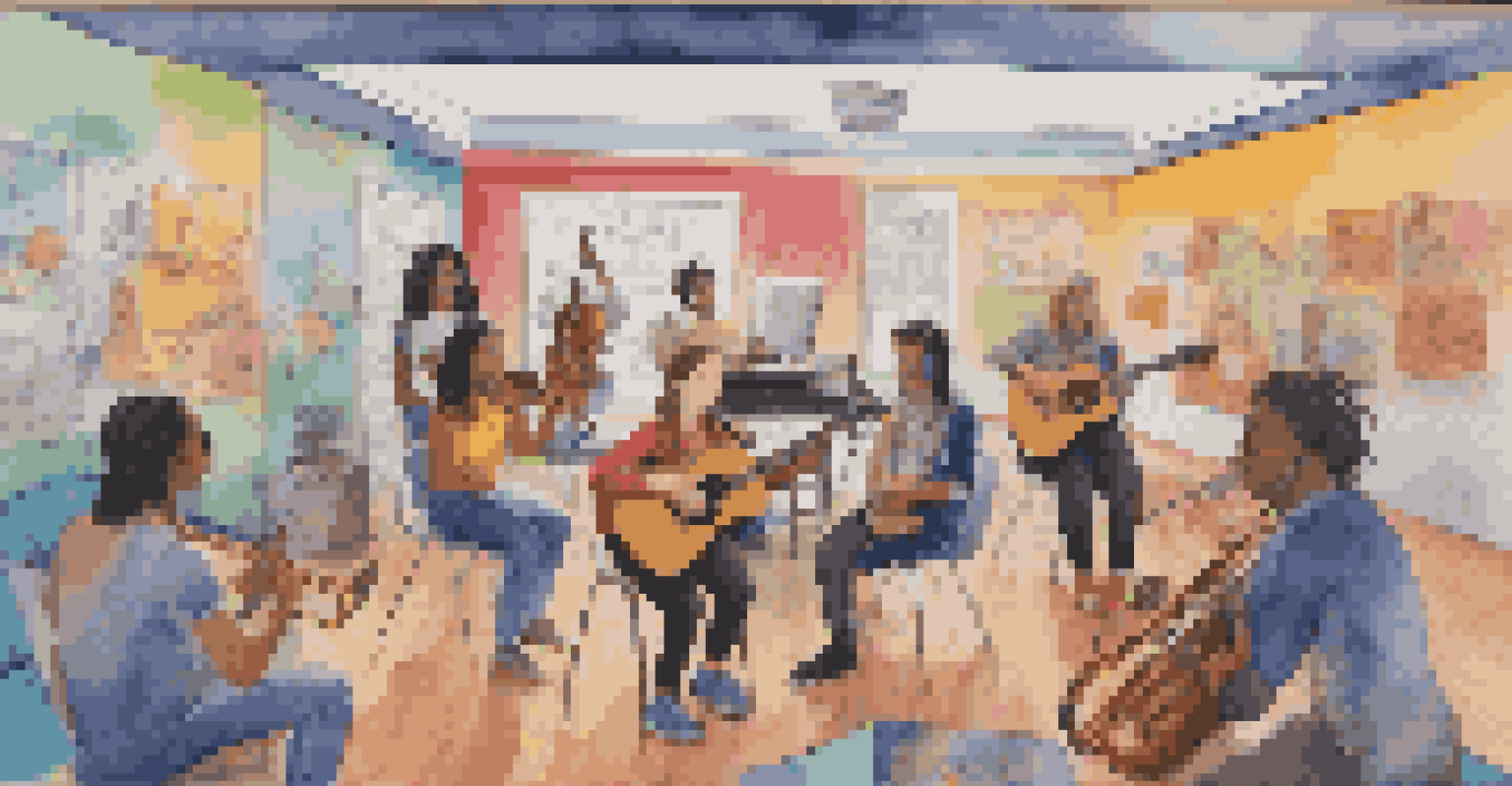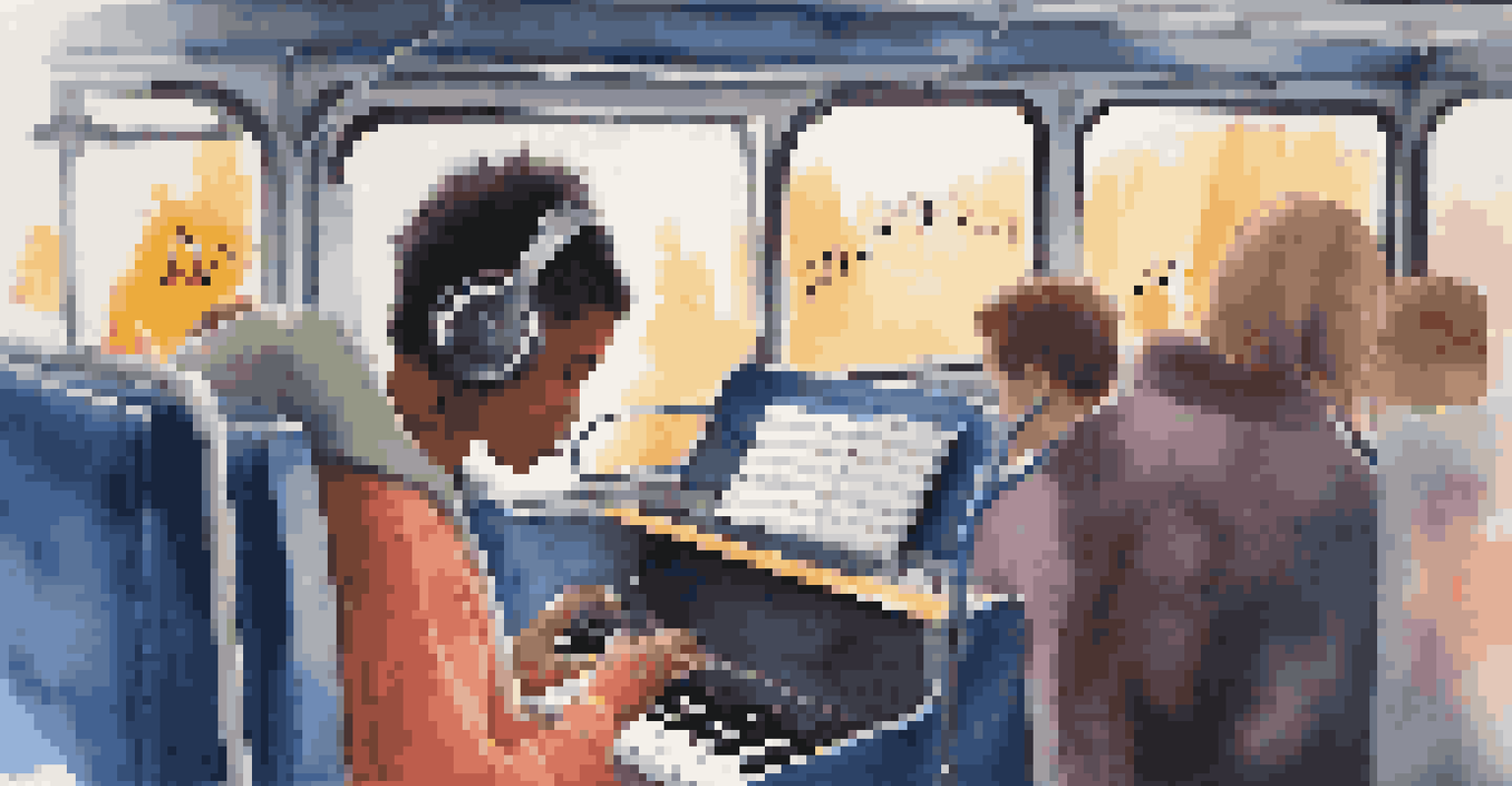How Technology is Supporting Young Musicians in Their Journey

Digital Platforms for Music Discovery and Collaboration
In today's digital age, platforms like SoundCloud and Bandcamp have transformed how young musicians share their work. These platforms allow budding artists to upload their tracks and gain exposure without the need for a traditional record label. Moreover, young musicians can collaborate with others from around the globe, fostering creativity and innovation.
The future belongs to those who believe in the beauty of their dreams.
Imagine a young guitarist in a small town teaming up with a vocalist in another country to create a unique song. This kind of collaboration is now not only possible but also encouraged through technology. By enabling these connections, digital platforms break down geographical barriers and create a vibrant community around music.
Additionally, social media platforms like Instagram and TikTok serve as powerful tools for promoting music. Young artists can showcase their talents through short videos, engaging a wider audience and potentially going viral, which can lead to more opportunities in the industry.
E-Learning Tools for Skill Development
E-learning has become a game-changer for young musicians looking to hone their craft. Platforms like YouTube, MasterClass, and even specialized music apps offer tutorials from industry professionals. This accessibility allows aspiring musicians to learn at their own pace and explore various styles and techniques.

For instance, a teenager interested in jazz can easily find resources ranging from beginner lessons to advanced improvisation techniques online. This personalized learning experience is invaluable, as it empowers young artists to discover what resonates with them musically. With just a few clicks, they can access a wealth of knowledge right from their homes.
Digital Platforms Empower Musicians
Platforms like SoundCloud and Bandcamp enable young musicians to share their work and collaborate globally without traditional barriers.
Moreover, many of these tools incorporate interactive elements, such as quizzes and progress tracking, making learning engaging and effective. Young musicians can receive instant feedback, allowing them to adjust their practice and improve faster than ever.
Affordable Recording and Production Software
Gone are the days when professional recording studios were the only option for creating high-quality music. Today, affordable software like GarageBand and Audacity allows young musicians to produce their tracks at home. This democratization of music production means that anyone with a passion for music can create and share their work without significant financial investment.
Music can change the world because it can change people.
Consider a young artist who writes songs in their bedroom. With just a laptop and some basic software, they can lay down tracks, mix, and even master their music. This not only boosts their confidence but also gives them full control over their artistic vision. They can experiment and iterate on ideas without the pressure of time constraints typically found in studio settings.
Additionally, these tools often come equipped with virtual instruments and sound libraries, enabling musicians to create rich, textured sounds. This means that even those who may not have access to traditional instruments can still produce compelling music.
Online Communities for Networking and Support
The internet has opened up a world of networking possibilities for young musicians. Online communities, such as forums and social media groups, provide a space for aspiring artists to connect, share experiences, and seek advice. This sense of community is crucial, especially for those who may feel isolated in their musical journey.
Imagine a young musician sharing their latest composition in an online group and receiving constructive feedback from peers and seasoned professionals. This type of interaction not only enhances their skills but also encourages them to keep pursuing their passion. These communities often host virtual events, competitions, and challenges that motivate young artists to improve.
E-Learning Enhances Musical Skills
E-learning tools provide young musicians with access to tutorials and interactive lessons, allowing personalized skill development at their own pace.
Furthermore, these networks can lead to real-life opportunities, such as gigs and collaborations. By putting themselves out there, young musicians can build a supportive network that nurtures their growth and encourages them to take risks.
Streaming Services as a Launchpad for Careers
Streaming services like Spotify and Apple Music have revolutionized how music is consumed, but they also serve as a launchpad for young musicians. By distributing their music on these platforms, artists can reach millions of listeners worldwide. This accessibility can significantly boost their visibility and open doors to new opportunities.
For example, a young pop artist can create a playlist that includes their songs alongside mainstream hits, which may attract new listeners who may not have discovered them otherwise. This kind of exposure can lead to increased fan engagement, concert bookings, and even potential record deals. The more streams they gain, the more likely they are to be noticed by industry professionals.
Additionally, many streaming platforms offer analytics tools that help artists understand their audience better. By analyzing listener demographics and engagement, young musicians can tailor their marketing strategies and connect more effectively with their fans.
Mobile Apps for Practice and Composition
Mobile technology has made it easier than ever for young musicians to practice and compose music on the go. Apps like Yousician and Noteflight provide interactive lessons and composition tools right at their fingertips. This flexibility allows artists to practice whenever inspiration strikes, whether they’re at home, on the bus, or waiting in line.
Consider a young pianist who uses an app to learn new songs during their commute. With features that listen to their playing and provide real-time feedback, they can refine their skills in a fun, engaging way. This convenience makes practicing feel less like a chore and more like an enjoyable part of their daily routine.
Social Media Builds Artist Brands
Social media allows musicians to engage with fans and promote their music, creating a personal brand that fosters dedicated followings.
Moreover, these apps often include features that foster creativity, such as chord progressions and backing tracks. This enables young musicians to explore their musical ideas and compose original pieces, even if they don't have access to traditional instruments.
Social Media for Building a Personal Brand
In a world where social media dominates, young musicians have the unique opportunity to build their personal brand online. Platforms like Instagram, TikTok, and YouTube allow artists to showcase their personalities and music in a way that resonates with their audience. This connection can turn casual listeners into dedicated fans.
For instance, a young singer can share behind-the-scenes footage of their songwriting process or live performances, giving fans a glimpse into their world. By engaging with their audience authentically, they can create a loyal following that supports their musical endeavors. The more they share, the more their brand grows.

Additionally, social media can serve as a marketing tool, where musicians promote their latest releases, merchandise, and upcoming shows. This direct line of communication helps maintain interest and excitement among fans, ensuring they remain engaged with the artist's journey.
The Future: Innovations in Music Technology
As technology continues to evolve, the future of music for young artists looks incredibly promising. Innovations such as artificial intelligence and virtual reality are beginning to change how music is created and experienced. For instance, AI can help musicians generate new ideas or even collaborate with them to compose music.
Imagine a young artist using an AI tool to help them overcome writer's block, generating melodies or lyrics that inspire new creations. This kind of support can be invaluable, allowing musicians to explore new directions they might not have considered otherwise. Moreover, virtual reality concerts could offer immersive experiences that connect artists with their fans in exciting ways.
As these technologies become more accessible, young musicians will have even more tools at their disposal to express their creativity. The possibilities are endless, and the next generation of musicians is poised to take the industry by storm, armed with the best technology has to offer.